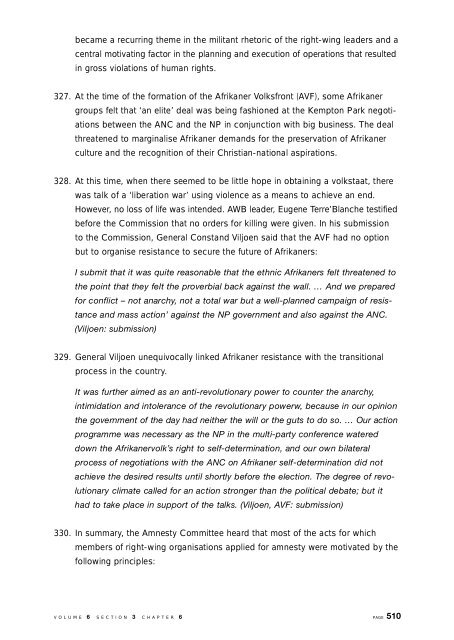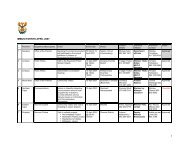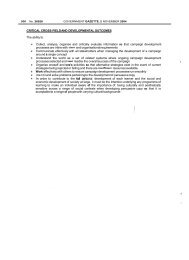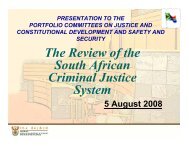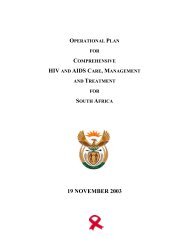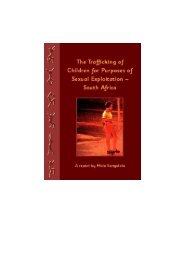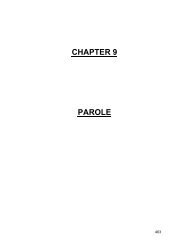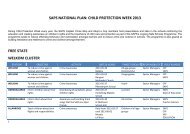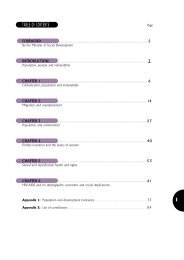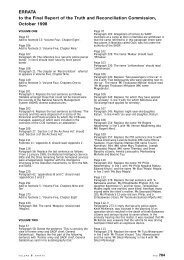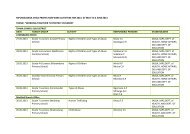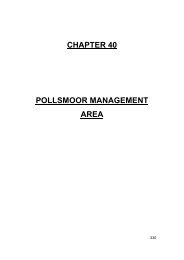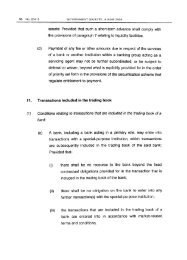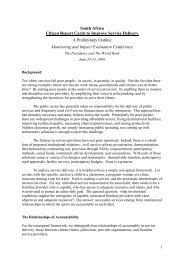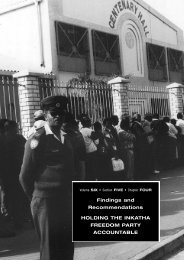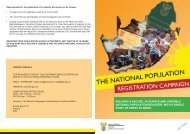Right-Wing Groups - South African Government Information
Right-Wing Groups - South African Government Information
Right-Wing Groups - South African Government Information
Create successful ePaper yourself
Turn your PDF publications into a flip-book with our unique Google optimized e-Paper software.
ecame a recurring theme in the militant rhetoric of the right-wing leaders and a<br />
central motivating factor in the planning and execution of operations that re s u l t e d<br />
in gross violations of human rights.<br />
327. At the time of the formation of the Afrikaner Vo l k s f ront (AVF), some Afrikaner<br />
g roups felt that ‘an elite’ deal was being fashioned at the Kempton Park negotiations<br />
between the ANC and the NP in conjunction with big business. The deal<br />
t h reatened to marginalise Afrikaner demands for the preservation of Afrikaner<br />
c u l t u re and the recognition of their Christian-national aspirations.<br />
328. At this time, when there seemed to be little hope in obtaining a volkstaat, there<br />
was talk of a ‘liberation war’ using violence as a means to achieve an end.<br />
H o w e v e r, no loss of life was intended. AWB leader, Eugene Te r re’Blanche testified<br />
b e f o re the Commission that no orders for killing were given. In his submission<br />
to the Commission, General Constand Viljoen said that the AVF had no option<br />
but to organise resistance to secure the future of Afrikaners:<br />
I submit that it was quite reasonable that the ethnic Afrikaners felt threatened to<br />
the point that they felt the proverbial back against the wall. … And we pre p a re d<br />
for conflict – not anarchy, not a total war but a well-planned campaign of re s i s-<br />
tance and mass action’ against the NP government and also against the ANC.<br />
( Viljoen: submission)<br />
329. General Viljoen unequivocally linked Afrikaner resistance with the transitional<br />
p rocess in the country.<br />
It was further aimed as an anti-re v o l u t i o n a ry power to counter the anarchy,<br />
intimidation and intolerance of the re v o l u t i o n a ry powerw, because in our opinion<br />
the government of the day had neither the will or the guts to do so. … Our action<br />
programme was necessary as the NP in the multi-party conference watere d<br />
down the Afrikanerv o l k ’s right to self-determination, and our own bilateral<br />
process of negotiations with the ANC on Afrikaner self-determination did not<br />
achieve the desired results until shortly before the election. The degree of re v o-<br />
l u t i o n a ry climate called for an action stronger than the political debate; but it<br />
had to take place in support of the talks. (Viljoen, AVF: submission)<br />
330. In summary, the Amnesty Committee heard that most of the acts for which<br />
members of right-wing organisations applied for amnesty were motivated by the<br />
following principles:<br />
V O L U M E 6 S E C T I O N 3 C H A P T E R 6 P A G E 5 1 0


